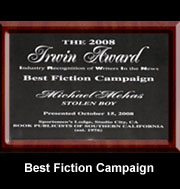I hardly knew the man, but I understood him well. Thick, tall, and deeply troubled, William McInerney wore the weight of someone tied to the bottom of a run away locomotive. He reeked from the guilt associated with crimes his son had been charged with. I had spoken with Bill several times since I first started covering his son’s case. His face was always tight with strain, his eyes penetrating the very depths of your thoughts with self-imposed anger. But through all the insanity that was Bill McInerney, one thing stood perfectly clear to this observer: the man had a heart that beat like a frantic drum upon his very thick sleeve.
Our first meeting was actually quite bizarre. My friend, and excellent Ventura County defense attorney, Brian Vogel, was representing Bill in relation to Brandon’s case. They were sitting and talking together one day in the hallway outside of court during one of Brandon’s early hearings, when I came up to have a word with Brian. Bill ultimately introduced himself and said he knew who I was because he had read some of the things I had written about his son’s case. He liked what I had to say and he practically begged me to please help do whatever I could to help save his son’s life. I could feel the pull of his words clatsping on my mind like an anchor. I abhorred the crime Brandon had been accused of committing, but I’ve also always been sympathetic to his plight in this particular instance. Children are never adults. And this child, who was barely fourteen years old when he took Larry King’s life away, must not, in all good conscience, be allowed to spend the rest of his life in an adult men’s prison. It just can’t happen, and I’ve never wavered in this opinion. But, I have also always, in the deepest and darkest recesses of my gray matter, felt it to be out of our hands in a worldly, physical kind of way, anyway.
It is inevitable that the Ventura County District Attorney will continue to prosecute Brandon McInerney as an adult, which will lead to the child being locked away for a mandatory minimum of fifty-one years, or the equivalent of the rest of his life. Gregory Totten will not change his mind. And Maeve Fox, the prosecuting attorney, appears relentless in her persecution of Brandon. This will not change. Thus, from the ways in which the universe operates, the only way for Brandon to truly change the reality that stares him directly in the face is for him to begin to transform his life from the inside out.
The world of form has not been good to Brandon nor his family. It has generated hatred and violence in his own home. It has led to harm being inflicted upon and between his parents. It has created a child who learned to solve his problems with two squeezes of his father’s trigger finger. Brandon’s lack of consciousness in childhood created a dire crisis that would threaten his life in the present. The only way for that to change will be for Brandon to begin transforming himself from within.
And that’s what I told Bill in court that day, and any time we had a chance to talk after that. That’s what it was going to take to save his son’s life. Bill stared at me with glazed-over eyes. And then I told him about the best book I’d ever read, one we use in our Transformational Third Thursdays workshops at Bank of Books, and what it had done for me and countless others. I told Bill McInerney, in front of his lawyer and the universe, and outside of his son’s courtroom, that the wisdom espoused by Eckhart Tolle could help to change his life. It could turn him around and help push him toward his true, joy-filled destiny, one he might never have imagined could exist for him. In the next breath I urged Brandon’s dad to get a copy of Eckhart’s newest book, A New Earth, read it, and digest everything in it that resonated with him. And then I told William McInerney in no uncertain terms that he should get a copy of the book to his son as quickly as possible. Figure out a way for someone to coach Brandon, to teach him the ways of the Light, so that Brandon could begin to transform the negative energies he’s been feeding into his tragic life situation into something he would want to live with forever.
PRESENT CONSCIOUSNESS = ULTIMATE REALITY
It didn’t appear to be an accident one day in court when I witnessed Bill’s father, Brandon’s grandfather, a hulk of a man sporting a full head of white hair, overflowing from a wheelchair that could barely withstand him. I would learn later that the elder McInerney was a former Marine who appeared to be paying dearly for the negative energies he had spent a lifetime breeding. Then, a few months ago, in court, I witnessed Bill McInerney being wheeled into court in his own wheelchair, wearing a neck brace and a sadly pitiful look. I couldn’t help but dwell on the irony of father-like-son. And then a couple months after that Bill didn’t even make it to his son’s hearing because he had been arrested and charged with felonies for allegedly threatening to kill his sister and blow away the entire Oxnard Police Department. And now, today, William McInerney is dead.
I’m sure Bill never followed my advice. It didn’t resonate with him as I had hoped it might. He couldn’t see the light through the darkness of alcohol and pills and depression and guilt. Bill McInerney simply never had a chance to succeed in life because his unconsciousness was too far out of control. He was not conscious in the way he lived his life. His life was filled with negative emotions and hate-filled thoughts that bred an antagonist reality around him. He treated life as a battle, and that’s what he got. And he lost. And now, his son Brandon wheezes in his father’s shadow. They have both flown recklessly and wantonly through life in unconscious states of being that ultimately has destroyed one, and the jury, so to speak, is still out on Brandon.
That’s why it is up to us to try to help save this child, to allow him to finally see the Light of day. He must have the opportunity to be rehabilitated. He must have that one shot at life his unconscious existence never offered him before. And, if we work really hard at this, maybe, somehow in the process we might be able to help Maeve Fox and the Ventura County District Attorney to also see the Light. “We’ve had enough death, Mr. Totten.” Two wretched souls have been wrenched from our community in this Greek Tragedy; please don’t take another. And, for Brandon, as the rest of us, we must combine our collective energies to transform this community crisis into something positive for us all. For Brandon, it’s the only way to avoid the destiny that has befallen his father. For the rest of us, it just might be our salvation.























